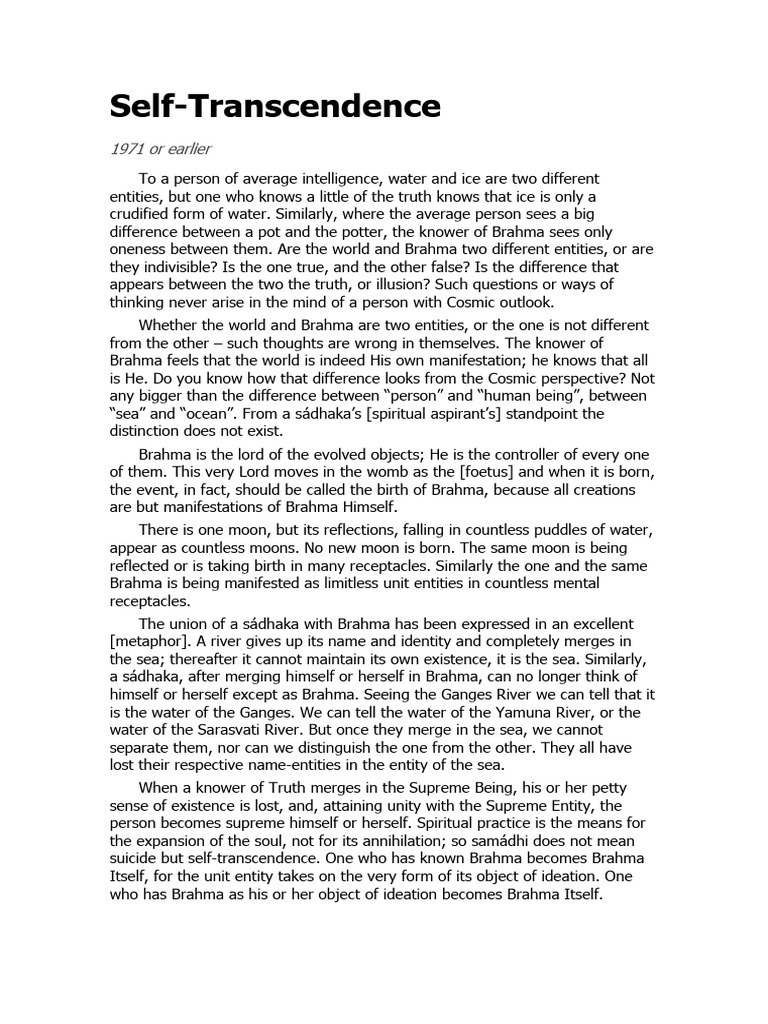The Bahá’í teachings present a profound framework for understanding oneself and the broader purpose of existence. These teachings emphasize the interconnectedness of all humanity and the importance of self-awareness and self-transcendence in achieving personal and collective growth. Self-awareness and self-transcendence are not merely personal pursuits but integral to the spiritual evolution of humanity. This discourse will elucidate four essential steps toward self-awareness and self-transcendence as outlined within Bahá’í principles, encompassing reflection, detachment, service, and the pursuit of virtues. Each step offers unique insights into personal and communal development.
Step 1: Reflection
The initial step toward self-awareness in the Bahá’í paradigm is reflection. This process involves examining one’s thoughts, actions, and motivations in a holistic manner. Reflection necessitates a mindful assessment of one’s life experiences and the values that underpin decisions. The Bahá’í Faith encourages individuals to engage in daily contemplation, fostering an environment of introspection.
During this reflective practice, individuals are urged to consider their purpose in life and the impact of their actions on others. This encompasses a dual responsibility: to oneself and to society. By dedicating time to this contemplative exercise, individuals are invited to unearth deeper understandings of their identity. Essential to this process is the acknowledgment of divine attributes within oneself, which, when recognized, can lead to greater self-acceptance and a more profound sense of connection to humanity.
Step 2: Detachment
Following the journey of reflection, the concept of detachment is central to the Bahá’í teachings. Detachment does not imply emotional aloofness or disengagement; rather, it embodies the cultivation of a dispassionate perspective towards material possessions, social status, and transient desires. The teachings advocate for a balanced approach, suggesting that while one may appreciate the temporal dimensions of life, it is essential to cultivate an awareness that transcends these superficial attachments.
By developing detachment, individuals can liberate themselves from the constraints of ego and societal expectations, thereby allowing for an authentic expression of the self. This detachment fosters resilience, as it enables individuals to face life’s uncertainties without the burden of incessant worry or despair. Ultimately, this liberation propels individuals toward a higher orientation of purpose wherein the true essence of the soul can manifest, facilitating deeper connections with others.
Step 3: Service
The third step on the pathway to self-awareness and self-transcendence within the Bahá’í framework is service. Engaging in acts of service is seen as a vital means of actualizing one’s understanding and reflection. The Bahá’í teachings espouse the importance of contributing to the well-being of society as an extension of personal spiritual growth. Service becomes a conduit for both self-discovery and altruism, as it necessitates moving beyond one’s self-interests and embracing the needs of others.
This action-oriented approach reinforces the notion that individuals are not isolated entities; rather, they are part of a larger tapestry of existence. The engagements fostered through community service provide opportunities for collective identity formation, promoting social cohesion. Additionally, serving others cultivates an understanding of the interconnectedness of all souls, reinforcing the Bahá’í view that self-transcendence is achieved through a commitment to the welfare of humankind. Through altruistic endeavors, individuals uncover latent strengths, enhancing their self-awareness indirectly while fostering spiritual vitality.
Step 4: Pursuit of Virtues
The final step towards achieving self-awareness and self-transcendence is the active pursuit of virtues. The Bahá’í teachings outline various virtues, including compassion, humility, justice, and love, advocating for their integration into daily life. The pursuit of these ideals creates a moral compass that guides actions and decisions, fostering a vibrant ethical framework.
Through intentional practice, individuals can embody these virtues, creating a ripple effect within communities. Such embodiment not only enhances the individual’s character but also contributes to a collective spirit of harmony and unity. The endeavor to cultivate virtues also aligns with the essence of self-discovery, as engaging with these higher attributes unveils deeper layers of one’s identity and purpose.
In conclusion, the Bahá’í teachings provide a compelling roadmap toward self-awareness and self-transcendence through reflection, detachment, service, and the pursuit of virtues. Each step interlaces to form a holistic approach that promotes personal and communal growth. By navigating this transformative journey, individuals not only cultivate a profound understanding of themselves but also contribute to the elevation of society as a whole. The emphasis on interconnectedness and collective responsibility underscores that the journey toward self-transcendence is not merely solitary but an integral part of humanity’s shared spiritual evolution.
